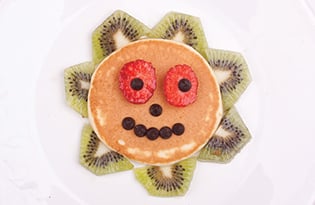Beat Behavior Issues With a Healthy Meal Plan

Is your child hyperactive or irritable after missing meals or after consuming cookies, pasta, or foods and drinks that contain the additive FD&C Red No. 40? Diet plays a large role in your child’s behavior. The saying, “You are what you eat” has much truth to it. While a healthy diet is not the magic cure for kids who struggle with distraction or hyperactivity at home or school, it can improve behavior.
Don’t skip breakfast
Food is our body’s fuel, and your child’s mental energy will drain without it. Kids need energy to get through the school day and need even more to stay on task.
Provide protein
A high-protein diet can help a child feel more energized and full, and have better cognitive function. Eggs, chicken sausage, lean turkey, cheese, apples, or almond or peanut butter elevate dopamine and acetylcholine neurotransmitters in the brain more than a high-carbohydrate breakfast of cereals with sugar, orange juice, and bananas or processed foods, which elevates insulin, increases serotonin, and can make your child feel foggy or mentally drained.
More omega-3, vitamin B complex and vitamin D
A 2008 study showed an increase in omega-3 fatty acids, vitamin B and vitamin D improved children’s vocabulary, reading scores and attentiveness. Kids ages 4 to 6 should take 500 milligrams of omega-3 daily and a multivitamin with vitamin B. They should also play outside regularly to get vitamin D exposure.
Be aware of gluten, dairy or processed foods
Some kids are sensitive (not allergic) to these types of foods. This sensitivity can cause gastrointestinal problems, which can lead to behavioral issues.
Eliminate food dyes
If your child becomes hyper or aggressive after consuming red dye contained in fruit drinks without real fruit or becomes irritable after consuming chemical additives found in soda or drinks that are the same color as antifreeze, serve water instead.
Family meals are important
Families that eat together produce successful adults. Create traditions such as technology-free Tuesday or family fun night Friday. Be a good listener and talk about family and personal goals to help kids thrive.
Dr. Barbara Kissam is a developmental behavioral pediatrician at Novant Health. She lives in Charlotte with her three kids and dog, Gus.









